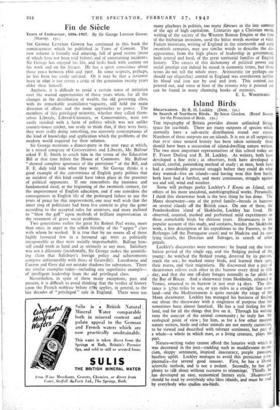Fin de Siècle
Years of Endeavour, 1886-1907. By Sir George Leveson Gower. (Murray. i5s.)
SIR GEORGE LEVESON GOWER has continued in this book the reminiscences which he published in Years of Content. The
r.ew volume is friendly and amusing, full of good stories (most of which have not been told before) and of entertaining incidents. Sir George has enjoyed his life, and looks back with content on his work and on his leisure. He has a quiet conscience about those years between 1886 and 1907. In some respects, perhaps, he has been too easily satisfied. Or it may be that a reviewer born in 1890 is too severe a critic of the generation twenty years older than himself.
Anyhow, it is difficult to avoid a certain sense of irritation over the wasted opportunities of those years when, for all the changes in the distribution of wealth, the old governing class, with its remarkable assimilative 'capacity, still held the main direction of affairs and the main approaches to power. The members of this privileged minority, tether they called them- selves Liberals, Liberal-Unionists, or Conservatives, were too easily satisfied with a form of politics which Was not unlike country-house cricket, too ready to think that, if they were busy, they were really doing something, too narrowly contemptuous of the kind of knowledge and application which the problems of the modem world required for their solution.
Sir George mentions a dinner-party in the year 1902 at which, in a mixed company of Conservatives and Liberals, Mr. Balfour
asked F. E. Smith to coach him in the terms of the Education Bill at that time before the House of Commons. Mr. Balfour "showed complete ignorance of the provisions" of the Bill, and F. E. dilly told him what they were. Sir George thinks' it a good example of the conventions of English party politics that an incident of this kind could have taken place in the presence of political opponents. If. one remembers the immense and fundamental need, at the beginning of the twentieth century, for the improvement of English education, and if one considers the consequences in English life of the prolonged failure to use the years of peace for this improvement, one may well wish that the inner ring of politicians had been less content to play the game according to the accepted rules for amateurs, and more inclined to "blow the gaff" upon methods of brilliant improvisation in the treatment of grave social problems.
Two generations earlier the great Sir Robert Peel wrote, more than once, in anger at the selfish frivolity of the " upper " class with whom he worked. It is true that by no means all of those highly favoured few in a favoured age were as politically irresponsible as they were socially imperturbable. Balfour him- self could work as hard and as seriously as any man. Salisbury was not a dilettante (incidentally, Sir George makes the astonish- ing claim that Salisbury's foreign policy and achievements• compare unfavourably with those of Granville). Lansdowne and Curzon and Grey did not mistake shadows for substances. There 'are similar examples today—including one superlative example— of intelligent leadership from the old privileged class.
Nevertheless, in spite of these many exceptions, past and present, it is difficult to avoid thinking that the verdict of history upon the French noblesse before 1789 applies, in general, to the last decades of " privileged " rule in England. There were too
many playboys in politics, oo many fiat' teurs in the late summer of the age of high capitalism. , Centuries ago a Christian monk, writing of the society' of the Western Roman Empire at the time of the barbarian invasions, used the bitter words moritur et rides. Future historians, writing of England in the nineteenth and early iwentieth centuries, may use similar words to describe the dis- appearance, from the high places of leadership in government, both central and local, of the great territorial families of English history. The causes of this dichotomy of political power and social prestige can indeed be stated. in economic terms, but those terms do not tell the whole story. Aristocratic (or perhaps one should say oligarchic) control in England was overthrown neither by blood and iron nor by coal and iron. This control. just petered out, and some at least of the reasons why it petered out can be found in many charming books , of memoirs.
E. L. WOODWARD,






























 Previous page
Previous page